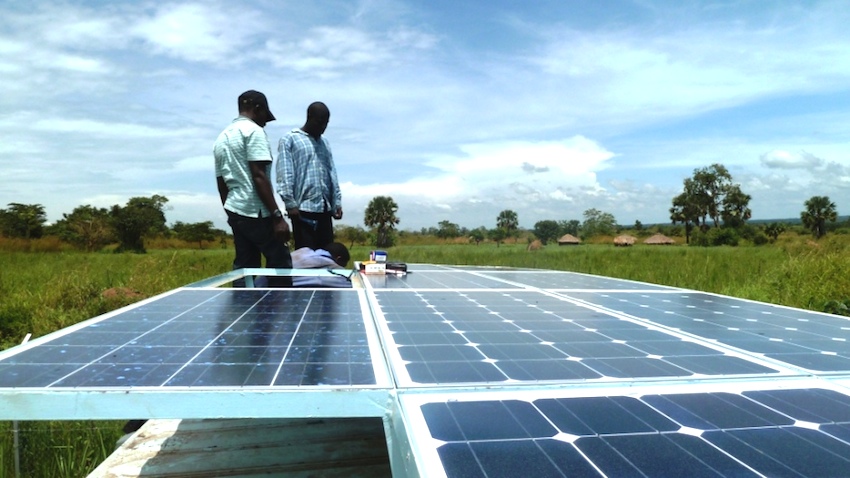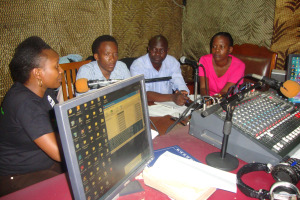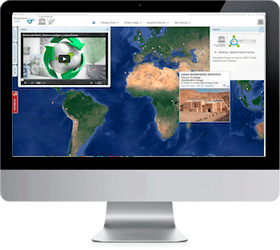100% access to clean energy services for all domestic, productive and social needs by 2020.
The District of Kasese in Uganda (approx.130,000 households), on the edge of the Queen Elizabeth Biosphere Reserve, has recently been the center of local and international initiatives that are aiming to radically transform the district by supplying the energy needs of its population only via renewable energy sources by 2020.
According to the Mayor of the municipality of Kasese this ambitious target will be achieved by adopting a wide variety of different renewable sources such as biomass, solar, geothermal and mini hydroelectric technologies. Kasese aims at becoming a model that other municipality will be able to adopt to eradicate poverty which is strictly related to the lack of access to energy. Furthermore developing an energy supply based on renewable energy sources will help the region overcoming issues related to local deforestation, land degradation as well as health issues which are strongly connected to the uncontrolled use of charcoal, firewood and kerosene, the main energy sources used in the region for cooking and for domestic electricity production.
In facts, only 7% of the households in Kasese have access to the electricity grid while 97% of the people use firewood and charcoal for cooking and 85% of households use kerosene for lighting. It should also be reminded that the average electricity consumption per capita in Uganda is 8 times lower than Africa’s average (578kWh) and over 40 times lower than the world’s average (2,752 kWh) per capita. All of these factors demonstrate how dealing with the 100% Renewable Energy target in this region acquires a completely different role than in industrialized countries: it is many often about providing access to the energy in regions where access to energy is still a privilege. Within this context developing strategies and implementation models to tackle the energy poverty issue through renewable energy has the potential to have enormous beneficial impacts for the local social and economic development.
Source & more information:
Light Up A Village Initiative
WWF – Uganda Country Office in collaboration with an international firm, Barefoot Power Uganda are starting an initiative to light up 100 homes in Kasese district with solar home systems before December 2012.
The initiative, known as Light Up A Village, seeks to make Kasese District a replicable model for the entire country on how to achieve renewable energy for all.
WWF and Barefoot believe clean energy is essential for poverty eradication and want to see a future where every Ugandan has access to clean, reliable and affordable energy.
A 2011 study by WWF-UCO revealed that 124,817 households in Kasese district depend on kerosene (paraffin) to light their homes at night. If these were enabled to replace their kerosene lamps with solar or another clean energy source, over 6,490,484 litres of kerosene would be saved per annum. This is equivalent to 7,788,581 dollars worth of kerosene saving based on the current local kerosene prices in Uganda.
Compared to paraffin, solar is cheaper, easy to use, saves time and does not produce soot which is a great health risk to the users.
Light up a village initiative
The WWF Uganda Country Office Clean Energy champion concept aims at establishing a replicable district model that is climate resilient and that harnesses renewable energy resources, such as the sun, wind, biogas, to meet energy needs for human development.
WWF UCO is partnering with Barefoot Power Uganda to work with a suitable qualified SACCOs to enhance clean energy access. The SACCOs will be from a community far off from the national electricity grid.
Barefoot, WWF and another Dutch based organization called MESICS are giving 25 million worth of solar equipment to one SACCOs in form of an interest free loan. Through a competitive process one SACCOs will be selected. The winning SACCOs will get a cash prize of 3,750,000. The SACCO will also qualify for an interest free loan of up to 10,000 dollars.
By December 2012, 100 homes will have been serviced with solar units. The two organizations will also identify a social facility from that village of the SACCO – such as a health centre or a police station and this will be equipped with solar free of charge.
The competition will be open for a week, from October 6 to October 13, 2012. The application forms are available at WWF Country Office in Kampala, WWF Kasese office, Kasese District Office, Guide FM, Messiah FM.
Source: WWF Unganda


















